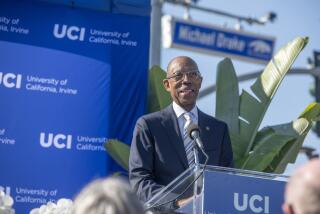Rocked by scandal, USC must heal its divisions and repair a broken culture
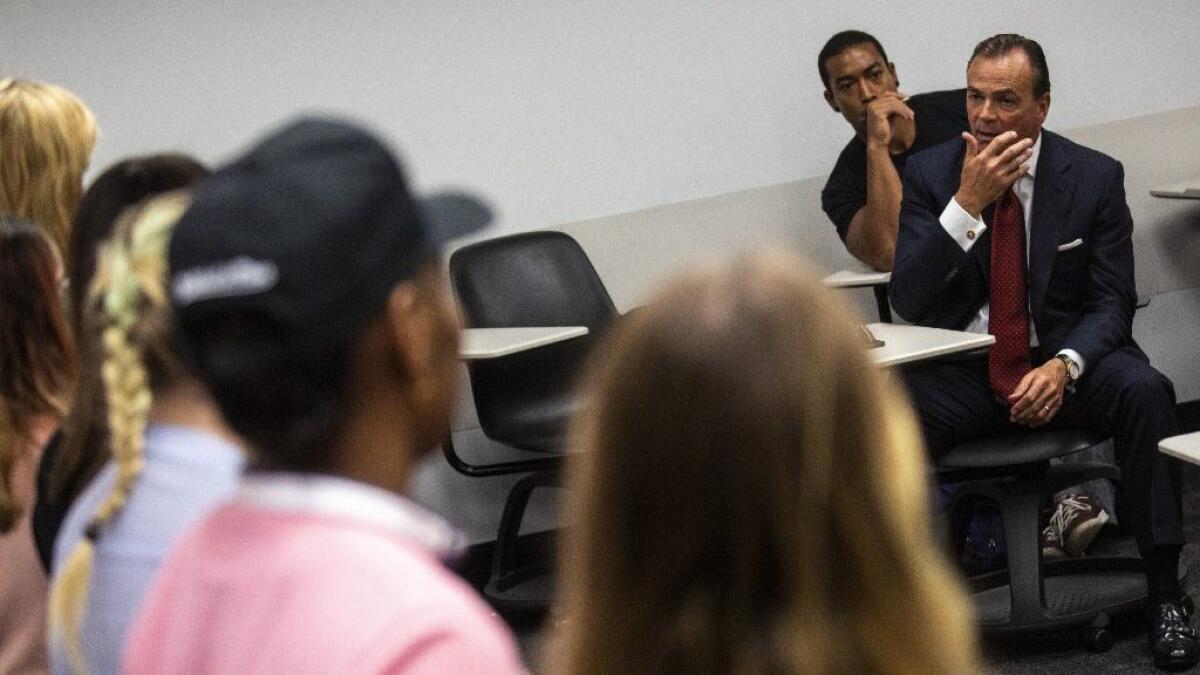
On a rainy day in late November, the billionaire chairman of USC’s board of trustees sat in the front row of a classroom as one female student after another described how the university had failed women.
“USC appears to be more concerned with protecting their brand or reputation than protecting their students,” said business major Cristina Jones.
Sexual assault victims were referred to a clinic 45 minutes away for treatment. Harassment was swept under the rug. The people running USC had little grasp of the problems of women and people of color.
“The board of trustees is mainly white men who are of the upper class,” undergraduate Imani Davis said.
At the close of the presentation, part of a gender studies course, board Chairman Rick Caruso applauded the students, gave them his personal email address and encouraged them to keep speaking out.
“As students, you do need to hold us accountable and you need to hold me accountable for making change,” Caruso said.
It was a remarkable moment that would have seemed impossible at USC seven months ago.
One of Southern California’s most important private institutions is in a state of profound upheaval in the wake of allegations that its longtime campus gynecologist, George Tyndall, committed sexual misconduct against hundreds of women over several decades. Tyndall had been the subject of complaints from students and staff since at least the 1990s but continued practicing until 2016, when a frustrated nurse went to the rape crisis center. Administrators and attorneys worked out a secret deal with the gynecologist that allowed him to leave USC with a financial package and a clean record with the medical board. The doctor has denied any wrongdoing.
The costs of the scandal are steep. USC lost the president, C.L. Max Nikias, who had overseen record-setting fundraising and played a central role in the university’s meteoric rise in academic stature. Now USC must find a new leader and confront a tarnished reputation, diminished fundraising and mounting legal bills. It must also heal divisions on its rich and powerful board, where some remain bitter that Nikias was forced out.
Many see opportunities amid the challenges. To them, the Tyndall scandal confirmed a nagging sense that USC’s climb in renown and wealth had come at the expense of ethical leadership and sound management. They regard this period as a chance to repair a broken culture.
Examples of wrenching change have abounded in recent months, starting with USC’s interim president, Wanda Austin, the first woman and person of color to lead the university. She ousted the popular business school dean this fall over his handling of harassment and discrimination complaints, a move many faculty members, donors and alumni condemned as hasty and shortsighted.
“I haven’t found one decision I’ve made where I’ve gotten unanimous support,” Austin said in a recent interview. “We have to send a message that ethics are first and foremost…. I feel like we are making progress.”
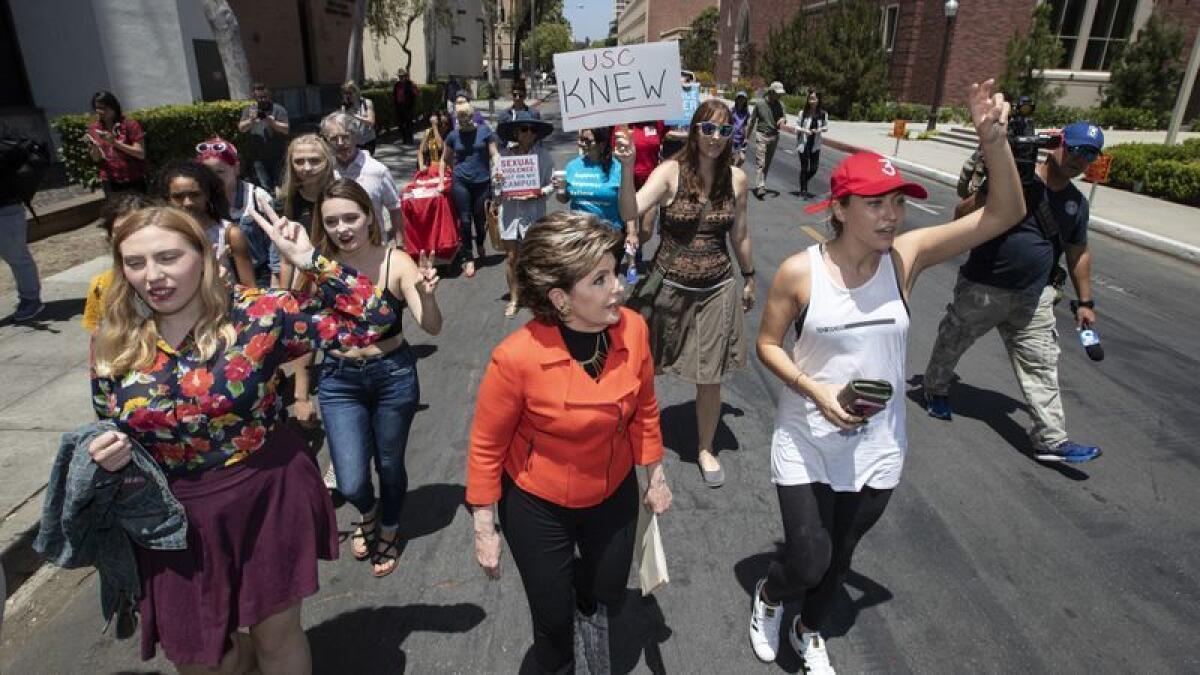
A faculty finds its voice
Perhaps the most obvious transformation is the invigoration of USC’s faculty. Shortly after the revelations about Tyndall burst into public view, a draft letter demanding Nikias’ resignation circulated among professors.
Unlike their public university peers, USC’s faculty had historically been reluctant to take on the administration. The authors of the letter feared few would sign. Ariela Gross, a law professor who wrote the first draft of the letter, said colleagues warned her against going public, saying it was more appropriate to gently suggest in private conversation that Nikias step down.
One professor approached to sign the letter was Margaret Rosenthal, a professor of Italian who had taught at USC since 1985. She took pride in her close relationships with students. As she read about Tyndall, she realized that many of the women who passed through her classes had been patients of the gynecologist.
She was sickened.
“I feel like the university has betrayed me and our students,” she recalled thinking.
About the same time, she and her husband, a physics professor, received a call from their daughter, a recent USC graduate living in Chicago.
“Can I talk to you?” their daughter asked. “George Tyndall was my doctor.”
Rosenthal and her husband signed the letter in May, along with 198 of their colleagues. Eventually hundreds more faculty members would demand Nikias’ resignation. The faculty senate unanimously voted to express no confidence in Nikias.
William Tierney, a longtime USC professor whose scholarship focuses on higher education, traced the faculty’s swift reaction to the view that Nikias and his team mishandled a string of scandals, including the 2017 revelations of drug use by former medical school dean Dr. Carmen Puliafito. He said Nikias made scant outreach to the faculty after the troubling allegations came to light.
“Then another horrible incident occurs and the faculty uprise in such a quick manner, like a wildfire,” Tierney said. “You can’t blame it on Tyndall…. What this brought to light: that there was deep unhappiness by the faculty with the way [Nikias] ran the university.”
Gross sees the faculty’s activism as a “lasting change.”
“People who were not political in any way have decided we have to organize together … and get in the face of the administration,” Gross said. “It is a real cultural shift at USC.”

USC’s elites come to terms with need for change
The effects on the 57-member board that runs USC are less certain. The trustees are some of the Pacific Rim’s most influential people, from Indian industrialist Ratan Tata and Silicon Valley entrepreneur Marc Benioff to Lakers owner Jeanie Buss and Hollywood legend Steven Spielberg.
The group adored Nikias for his elevation of the university. Critics, however, said the deferential relationship allowed for little genuine oversight.
After the allegations against Tyndall became public, the board initially stood by Nikias. In the face of days of outrage from the faculty and student body, USC announced “an orderly transition” to a new president May 25. But trustees continued to privately voice support for the president for longer than has previously been reported.
In a closed session the next week, trustees approved another one-year term for Nikias. It was a pro forma vote done every May for the president, but for many trustees, it was an expression of confidence in Nikias’ continued leadership. Although few would say so publicly, they saw him as the only person qualified to lead USC during the crisis and wanted him to stay in office through the lengthy process of selecting a new president.
USC did not announce Nikias’ renewal, though.
“I honestly believe we confused the entire community,” said longtime trustee Stanley Gold, the chairman of Shamrock Holdings, the late Roy Disney’s personal investment firm.
Many faculty members and students believed that Nikias had resigned or even been banned from the grounds. When they kept seeing him and his chauffeured SUV on campus, rumors circulated that Nikias wasn’t stepping down after all.
A new faculty petition to oust the president before the start of the fall semester garnered more than 700 signatures. In a meeting in Nikias’ office, a group of those with the title of university professor — the elite of USC’s academics — urged him not to stay on even in a temporary capacity.
“We all said our two cents,” said Tierney, the education professor. “It was a sad meeting.”
Trustees including Gold, billionaire entrepreneur Ming Hsieh and entertainment lawyer Bruce Ramer still wanted to keep Nikias through the transition, according to people with knowledge of board discussions. They believed that the president himself had not mishandled Tyndall. After all he had done for the university, they argued, he did not deserve such an ignominious end.
Nikias worked to catapult USC to the ranks of elite research universities while anchoring a $7-billion fundraising campaign, extending USC’s ties to Asia and dramatically renovating its South L.A. campus.
Caruso, who had taken over as board chairman in the wake of the scandal, was meeting with students, parents, professors and staff in that period and found the depth of their resentment toward Nikias striking, he recalled. His own 17-year-old daughter was starting at USC in August, and he said he could easily imagine the outrage if Nikias was present to welcome freshmen and their families.
“How unfair to the students?” Caruso said, adding that he could understand them asking “‘Why am I on this campus where there’s protests and faculty is walking out?’”
Before a trustees meeting in August, the mall developer and Nikias met, and Nikias agreed to step down.
“Over the summer, I came to a decision that my departure would be the best course of action for the university,” Nikias said in a recent statement to The Times. Through a USC spokeswoman, he declined to be interviewed.
When he walked into the boardroom, some trustees were in tears. Board members voted one of their own, Austin, a retired aerospace executive and alumna, to serve as interim president.
Some trustees remain angry about what they perceive as Nikias’ shabby treatment. In an interview, Gold rejected the view that the Tyndall episode revealed moral failings in university leadership. He offered another position: that Tyndall and the previous scandal involving a former medical school dean occurred because non-academic offices such as human resources did not advance with the rest of the university.
“We failed to look at keeping our infrastructure and systems apace with our growth,” Gold said.
As part of the response to Tyndall, a committee of five trustees is studying how other college boards function and is expected to propose reforms that would make USC’s board smaller and more involved in university affairs.
In a campus ballroom this fall, a group of trustees sat silently for two hours as a parade of students, staff and alumni criticized the university. There were complaints about a lack of resources for students living in the U.S. illegally, faulty electrical outlets in classroom buildings and a lackluster commitment to environmental sustainability.
A law student advocated for better treatment of custodians. “These people make the university tick,” the student chided.
The listening sessions, several of which were held to assist the 23-member presidential search committee, are one example of the university’s new posture of transparency.
“It shows you the ideals you’d hope the university should aspire to,” Geoffrey Cowan, a professor and former dean serving on the search committee, said of the listening forums.
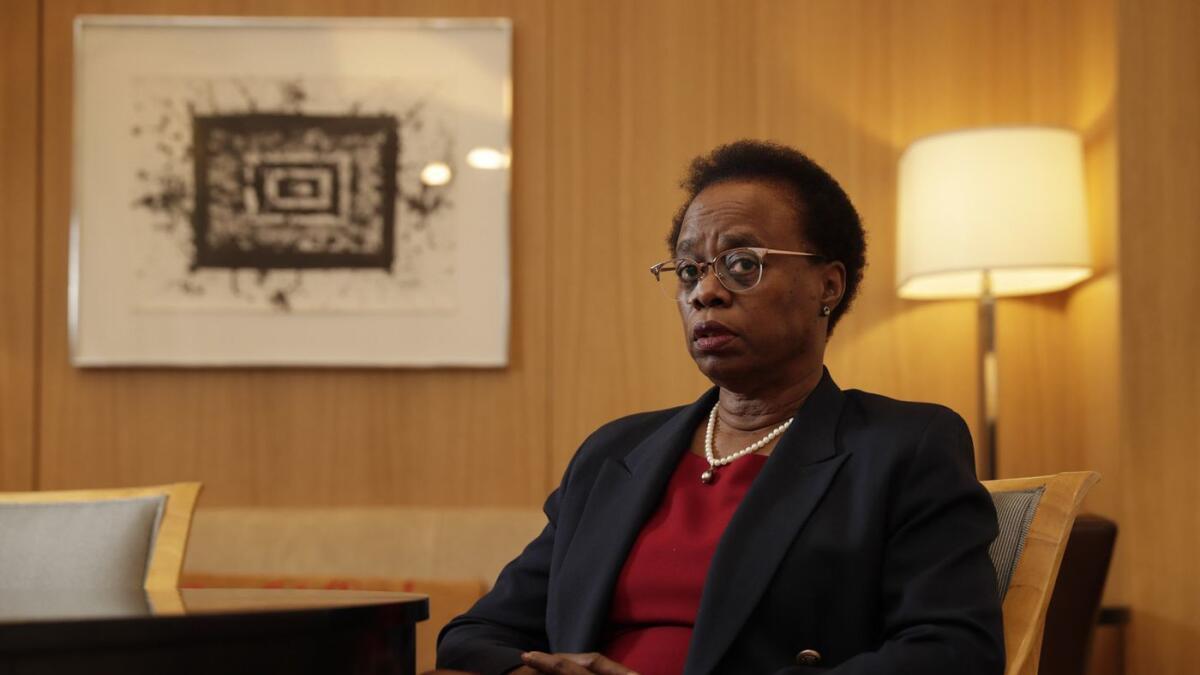
Tests of a new culture
The university’s stated commitment to transparency and accountability has been tested.
In June, a USC employee developed suspicions about the routing of a $100,000 donation to the school of social work from the campaign account of one of L.A.’s most powerful politicians, county Supervisor Mark Ridley-Thomas. The social work dean routed the gift to a nonprofit think tank controlled by the supervisor’s son, a former state legislator recently hired by USC as a professor. The employee alerted supervisors, who in turn reported it to top administrators.
USC fired Ridley-Thomas’ son, reassigned the dean and referred the case to federal prosecutors for criminal investigation. The supervisor and his son have denied any wrongdoing.
Caruso said he was heartened that the whistleblower had come forward and saw it as evidence of a new, more open culture.
“People felt safe enough now to say something,” he said.
More recently, USC’s leadership has come under fire for the ouster of James Ellis, dean of the Marshall School of Business. After consulting outside experts about the dean’s record on harassment and discrimination, Austin told Ellis that his term would end at the close of the spring semester. Ellis and his supporters fought the move, staging protests on campus and making it a referendum on the interim president’s legitimacy.
Caruso and Austin publicly portrayed Ellis’ removal as necessary to the culture shift. After Austin privately presented her findings to the board, it overwhelmingly supported her decision.
‘Change that. Today.’
At Caruso’s November visit to the gender studies class, a student pointed out several flaws in TommyBot, a university app designed to provide instant answers to students’ questions.
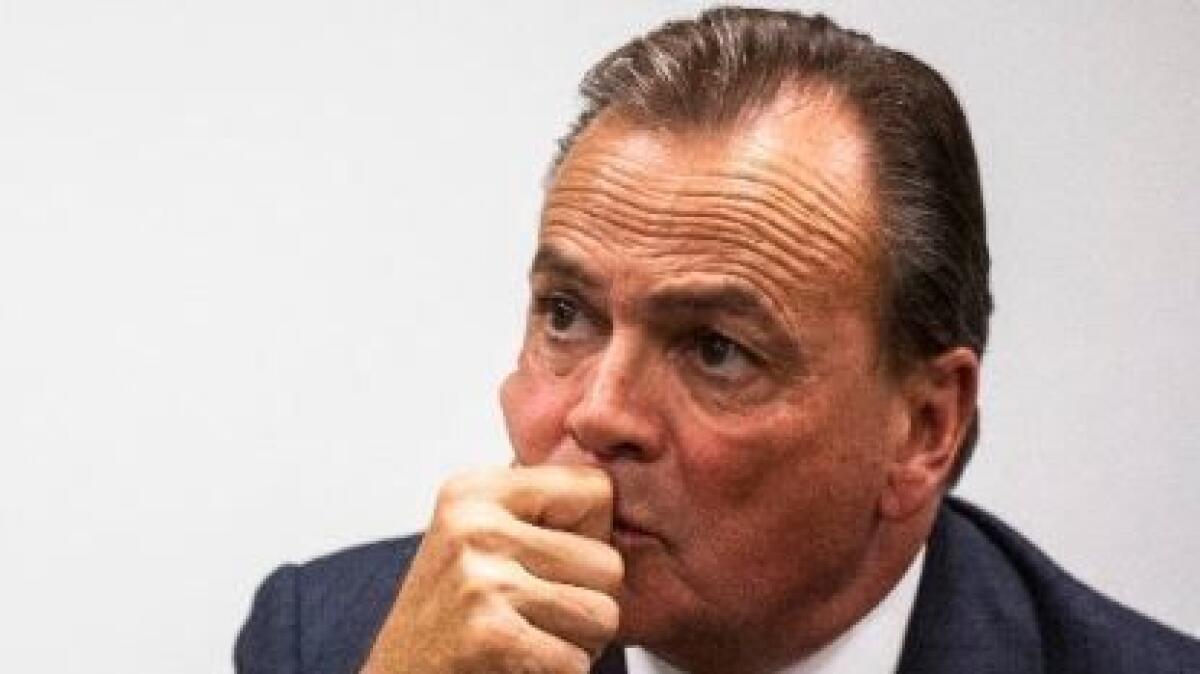
When asked “What do I do if I am sexually assaulted?” the student demonstrated, the app referred to a website on how to join a fraternity or sorority.
There was a gasp in the classroom. In his front-row seat, Caruso appeared stricken and whispered to a deputy: “Change that. Today.”
USC upheaval: Read the full Times investigation »
Twitter: @latimesharriet
Twitter: @MattHjourno
More to Read
Sign up for Essential California
The most important California stories and recommendations in your inbox every morning.
You may occasionally receive promotional content from the Los Angeles Times.

